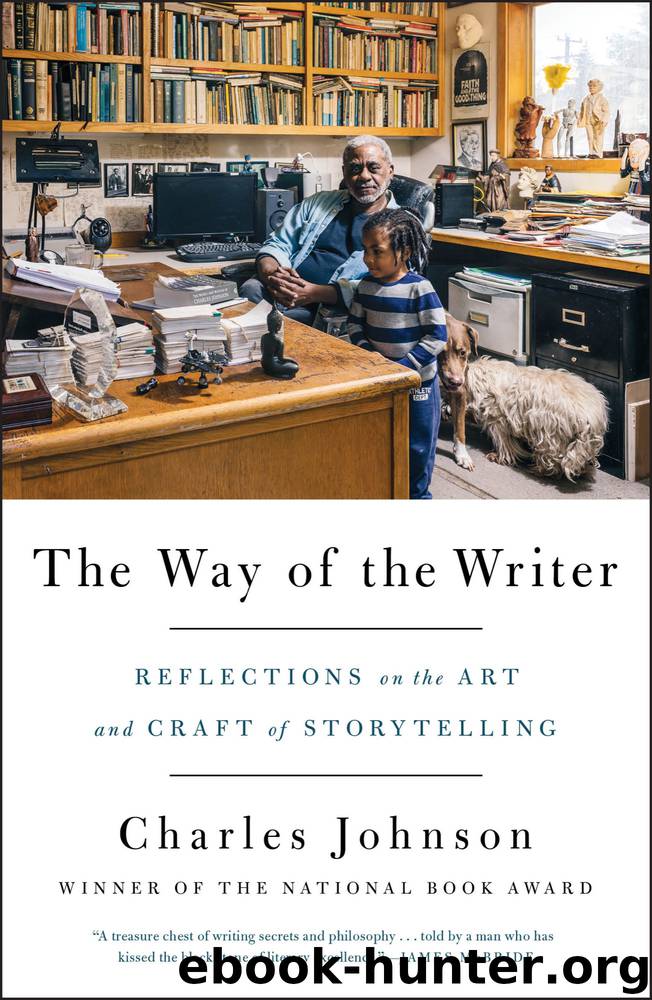The Way of the Writer by Charles Johnson

Author:Charles Johnson
Language: eng
Format: epub
Publisher: Scribner
20. The Essay
E. Ethelbert Miller says: Let’s talk about the essay form. What makes for a good essay? Where have the ideas for your essays come from? Do people (magazines/newspapers) request them? Have you been moved to write an essay because of something you’ve read or an event in your life? Who do you admire or respect when it comes to the essay writer? What is a good length for an essay? What role might philosophy play in shaping the content of an essay?
Let me start my answer for this question by repeating something a reviewer said of my essays in Turning the Wheel: Essays on Buddhism and Writing. He said I was a superior essayist, but not a great one. I think that judgment is fair. The essay as a literary form comes easily to me. About 50 percent of my body of published work is nonfiction (or the essay.)
But I’m not a great essayist, nor have I worked at being one. A truly great American essayist is someone like James Baldwin, who gave us perhaps a dozen essays that will forever define a certain dimension of the American experience. (Like many critics, I feel his essays are superior to his fiction, though his first novel, Go Tell It on the Mountain, is worth discussing for historical reasons.) Baldwin’s essays, in addition to being beautiful performances of language, pack a rare emotional power. I work to get emotion into my fiction, but in my essays and articles I’m not emotional, just professorial in my effort to clarify a subject, first for myself, then hopefully for a reader. At best, my work in the essay form might be called meditational.
This work came about probably as an extension of my background in journalism when (briefly) I was a newspaper reporter, columnist, and features writer in Illinois in the late 1960s and early ’70s. Philosophy is also a contributing factor to the essays I’ve written insofar as in the early 1980s I made a strong effort to teach myself how to write philosophically for popular magazines; in other words, finding ways to express often esoteric concepts without using the tribal languages employed in philosophy seminars and academic publications for specialists. I believe the first work where I managed to successfully do that was “Philosophy and Black Fiction,” published in Obsidian in 1980. And, of course, in the essays I’ve written for popular Buddhist magazines what I attempt to do is present philosophical concepts and experiences with accuracy and clarity in a way that is also reader-friendly. What Edgar Allan Poe said of the short story probably applies to the essay: namely, it likely works most effectively as an experience if it can be read in a single sitting. And for me, what I value in the essays I read (and hope occurs in the ones I write) is the fact that the writer has offered me the opportunity to carefully and methodically think or reason along with him or her about a particular subject.
Download
This site does not store any files on its server. We only index and link to content provided by other sites. Please contact the content providers to delete copyright contents if any and email us, we'll remove relevant links or contents immediately.
4 3 2 1: A Novel by Paul Auster(12368)
The handmaid's tale by Margaret Atwood(7752)
Giovanni's Room by James Baldwin(7320)
Asking the Right Questions: A Guide to Critical Thinking by M. Neil Browne & Stuart M. Keeley(5755)
Big Magic: Creative Living Beyond Fear by Elizabeth Gilbert(5753)
Ego Is the Enemy by Ryan Holiday(5412)
The Body: A Guide for Occupants by Bill Bryson(5077)
On Writing A Memoir of the Craft by Stephen King(4925)
Ken Follett - World without end by Ken Follett(4720)
Adulting by Kelly Williams Brown(4564)
Bluets by Maggie Nelson(4544)
Eat That Frog! by Brian Tracy(4519)
Guilty Pleasures by Laurell K Hamilton(4438)
The Poetry of Pablo Neruda by Pablo Neruda(4091)
Alive: The Story of the Andes Survivors by Piers Paul Read(4017)
White Noise - A Novel by Don DeLillo(4001)
Fingerprints of the Gods by Graham Hancock(3986)
The Book of Joy by Dalai Lama(3971)
The Bookshop by Penelope Fitzgerald(3843)
